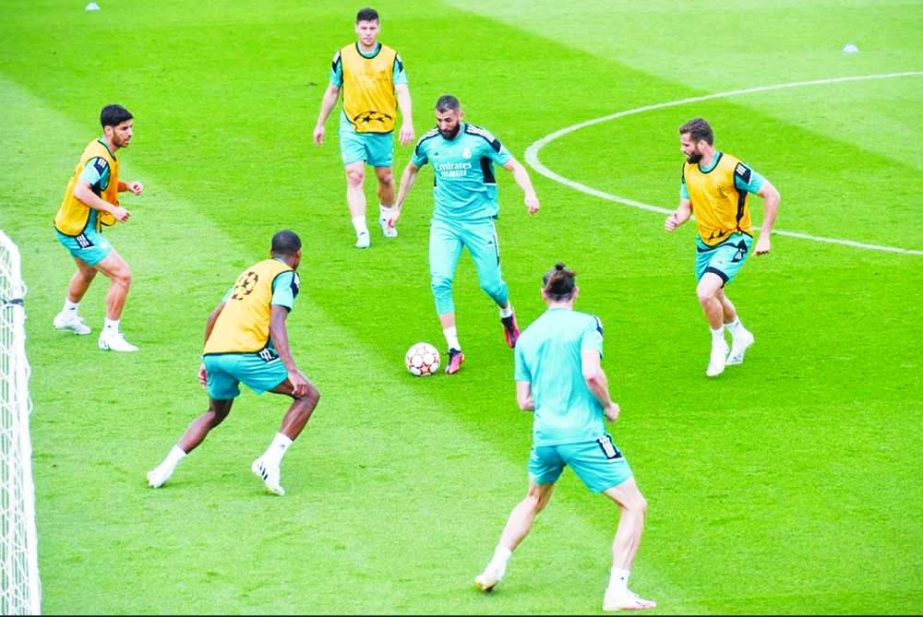
BBC Online :
As Real Madrid’s ageing stars watched on from the touchline while their younger counterparts saw out a remarkable Champions League semi-final victory, it was evidence that the club’s immediate and longer term future may be in better shape than many critics have suggested.
None of Karim Benzema, Luka Modric, Toni Kroos or Casemiro was on the pitch as the final whistle went on a 6-5 aggregate success over Manchester City that earned Carlo Ancelotti’s side a spot in Saturday’s final against Liverpool.
Rodrygo wrote his name into Real folklore with two late goals to take that tie to extra time, Eduardo Camavinga glided across the turf making the Bernabeu his own and Federico Valverde’s engine was still whirring after 120 minutes.
Brazil forward Vinicius Junior, whose tally of 51 appearances this season is more than any of his team-mates, scored a superb solo effort in the first leg and lasted until five minutes from time in the second.
In many ways – despite the frustration at failing to land Kylian Mbappe from Paris St-Germain and the problems that may arise from that – this Champions League run has seen president Florentino Perez’s transfer strategy of the past few years come to fruition, with the talented prospects he has invested in delivering on their potential at key moments to put Real on the verge of a 14th European Cup triumph.
It has also provided a glimpse of the evolution at the La Liga champions as Modric and Benzema enter their twilight years following a decade at the club in which they helped deliver four Champions Leagues.
Alongside Kroos and Gareth Bale, they are the stars remaining from the early years of Perez’s second tenure in which the ‘Galactico’ approach that characterised his first stint as president continued.
In the early 2000s, the arrival of Luis Figo from rivals Barcelona was followed by high-profile acquisitions of Zinedine Zidane, Ronaldo, David Beckham and Michael Owen. On Perez’s return in 2009, it was Kaka and Cristiano Ronaldo to kick things off.
Since James Rodriguez’s arrival after the 2014 World Cup, the only real Galactico business Madrid have done was splashing an initial £89m on a 28-year-old Eden Hazard from Chelsea.
The rest of their recruitment has focused largely on younger prospects – albeit by no means cheap – or free transfers.
Last summer David Alaba’s free transfer from Bayern Munich and the £28m move for teenage Rennes midfielder Camavinga were the only incomings, following a season of no signings.
Former Real boss Jorge Valdano analysed the situation in 2017. “Did Florentino change?” he asked. “No. The market changed. Now it’s incredibly difficult for the club to be able to wait for a talent to mature into a Ballon d’Or winner and then buy them just because you’re Real Madrid.”
Real’s pursuit of Vinicius highlighted their strategy of trying to sweep up the best young players in the world, with chief scout Juni Calafat – who also spotted Rodrygo and defender Eder Militao – travelling to Brazil to secure Vinicius’ signature when he was only 16 and had played only 17 minutes of senior football for Flamengo.
Vinicius completed his move to Madrid in a deal worth £39m once he turned 18 in July 2018.
“Vinicius and I made the jump from Flamengo to Real Madrid. But there is a big difference,” says former Brazil winger Savio, who signed in 1997.
“I left Flamengo when I was 23, almost 24. I left with a bit more experience. I learned a lot of things in the first season, mainly in terms of changing countries, football, tactics.
“But Vinicius was 18 years old, a very young player. He practically jumps from Flamengo, from the youth teams, to the first team. So there were still things to learn, to take to the pitch in terms of technique and tactics.
“Real Madrid is a very big change. In the first season and second season he got to know the club better – how they play – because between South American football and European football is a very big change. It was a question of time to get to know the tactics, the style of play, the style of the club.”

